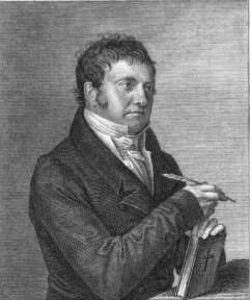Evening pictures
(Poet's title: Abendbilder)
Set by Schubert:
D 650
[February 1819]
Still beginnt’s im Hain zu tauen;
Ruhig webt der Dämmrung Grauen
Durch die Glut
Sanfter Flut,
Durch das Grün umbüschter Auen,
So die trunk’nen Blicke schauen.
Sieh, der Raben Nachtgefieder
Rauscht auf ferne Eichen nieder.
Balsamduft
Haucht die Luft;
Philomelens Zauberlieder
Hallet zart die Echo wieder.
Horch! des Abendglöckleins Töne
Mahnen ernst der Erde Söhne,
Dass ihr Herz
Himmelwärts,
Sinnend ob der Heimat Schöne,
Sich des Erdentands entwöhne.
Durch der hohen Wolken Riegel
Funkeln tausend Himmelssiegel,
Lunas Bild
Streuet mild
In der Fluten klarem Spiegel,
Schimmernd Gold auf Flur und Hügel.
Von des Vollmonds Widerscheine
Blitzet das bemooste, kleine
Kirchendach.
Aber ach,
Ringsum decken Leichensteine
Der Entschlummerten Gebein.
Ruht, o Traute! von den Wehen,
Bis beim großen Auferstehen
Aus der Nacht
Gottes Macht
Einst uns ruft, in seiner Höhen
Ew’ge Wonnen einzugehen.
Dew is quietly beginning to settle in the grove;
The grey of dusk is calmly weaving its way
Through the glow
On the gentle waters,
Through the green of the meadows surrounded by bushes;
Thus it is that our drunken gaze beholds it.
Look! The nocturnal feathers of the ravens
Coming down cause a rustling in the distant oaks. –
The scent of balsam
Can be smelt in the air;
Philomel’s magical songs
Resound tenderly in the echo.
Listen! The notes of the evening bell
Are sending a powerful reminder to the sons of earth
That their hearts
Should turn heavenwards,
As they reflect on the beauty of home
And the need to break their attachment to the fripperies of earth.
Through the canopy of the high clouds
A thousand heavenly seals are glittering,
The image of Luna
Is gently being scattered
Over the clear mirror of the flooding waters,
Shining gold on the fields and hills.
From the reflection of the full moon
Flashes the moss-covered small
Roof of the church.
But oh!
All around, tombstones cover
The bones of those who have fallen asleep.
Dear friends, take a rest after your sorrows,
Until at the great resurrection,
Out of the night,
God’s power
Eventually calls us up to his heights,
To enter into eternal bliss.
All translations into English that appear on this website, unless otherwise stated, are by Malcolm Wren. You are free to use them on condition that you acknowledge Malcolm Wren as the translator and schubertsong.uk as the source. Unless otherwise stated, the comments and essays that appear after the texts and translations are by Malcolm Wren and are © Copyright.
☙
Themes and images in this text:
Air Black Bells Bones and skeletons Clouds Dew The earth Echo Eternity Evening and the setting sun Feathers and plumage Fields and meadows Floods and tides Gazes, glimpses and glances Gold Graves and burials Green Grey Hearts Heaven, the sky High, low and deep Hills and mountains Home (Heimat) Mirrors and reflections Moss Near and far Night and the moon Nightingales, Philomel Noise and silence Oak trees Pictures and paintings Pouring, scattering and strewing Ravens Rest Resurrection Roofs Smells Stars Surface of the water Weaving Woods – groves and clumps of trees (Hain)
Although the text begins in silence (‘Still’), the poet soon draws our attention to the sounds as well as the sights of evening. The rustling of the roosting ravens, the echoing song of the nightingale, and the solemn striking of the bell all add to the intensity of the experience. There is smell, too, with balsam pervading the air.
The text also leads us through the stages of late evening, from a time at dusk when some of the natural colour of day (the green of the meadows) is still interwoven with the encroaching grey, to a later point when stars are twinkling and the full moon takes on a golden colour. In a miraculous feat of triple reflection, the golden light of the setting sun that illuminates the moon is said to be scattered on the flat mirror of the water below, which in turn lights up the fields and hills.
Just as the sound of the evening bell is taken to be a warning to human beings to wean themselves off the delights of earth, so moonlight shining off the small church and its surrounding graveyard is a reminder of the sleep that we all fall into. It is not just the day that is coming to an end. Human life also ends in a sleep. As we look out at the stones that mark the final resting places of those who have fallen asleep before us, before we ourselves go to bed, we are reminded that a new day will dawn. Just as certainly as night ends will come the great resurrection.
☙
Original Spelling and note on the text
Abendbilder
Still beginnt's im Hain zu thauen;
Ruhig webt der Dämm'rung Grauen
Durch die Gluth
Sanfter Fluth,
Durch das Grün umbüschter Auen,
So die trunk'nen Blicke schauen.
Sieh'! der Raben Nachtgefieder
Rauscht auf ferne Eichen nieder. -
Balsamduft
Haucht die Luft;
Philomelens Zauberlieder
Hallet zart die Echo wieder.
Horch! des Abendglöckleins Töne
Mahnen ernst der Erde Söhne,
Daß ihr Herz
Himmelwärts,
Sinnend ob der Heimath Schöne,
Sich des Erdentands entwöhne.
Durch der hohen Wolken Riegel
Funkeln tausend Himmelssiegel,
Luna's Bild
Streuet mild
In der Fluthen klarem Spiegel
Schimmernd Gold auf Flur und Hügel.
Von des Vollmonds Wiederscheine
Blitzet das bemooste kleine
Kirchendach.
Aber ach!
Ringsum decken Leichensteine1
Der Entschlummerten Gebein.
Ruht, o Traute! von den Wehen,
Bis beym großen Auferstehen
Aus der Nacht
Gottes Macht
Einst uns ruft, in seiner Höhen
Ew'ge Wonnen einzugehen.
1 Schubert changed the original 'kühle Steine' (cool stones) to 'Leichensteine' (gravestones)
Confirmed by Peter Rastl with Schubert’s source, Die heilige Lyra. Von Johannes Petrus Silbert. Wien, 1819. Gedruckt bey Anton Strauß, pages 180-181.
To see an early edition of the text, go to page 180 [194 von 260] here: http://digital.onb.ac.at/OnbViewer/viewer.faces?doc=ABO_%2BZ170651306


